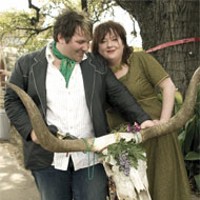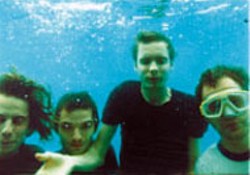The bands? Here's where it gets tricky. Any number of acts might fit the loose description given in the first paragraph, but a partial listing would include Slint, Japan's Acid Mothers Temple, Air, Sigur Ros, The Boredoms, Radiohead, Gastr del Sol, Sonic Youth, Godspeed You Black Emperor(!), Jim O'Rourke, Mogwai, Tortoise, The Sea and Cake, Radiohead, Spiritualized, and, on the basis of their last record (influenced a lot by O'Rourke), Wilco.
Well, maybe Wilco. As with anything artistic, you can both identify and restrict a band with a label like post-rock. Post.alt.country, perhaps?
In a world where the "alternative" is now mainstream, many of the above-mentioned post-rock artists have risen to become some of the most feted acts in rock. However, critical huzzahs don't mean records will start flying off the shelves -- in the rock era, of course, one need not be groundbreaking to be recordbreaking.
Indeed, the black hole of popular stardom leaves most artists with only one real choice: Jump into a surreal, almost certain death, or turn around and walk away. The post-rock crowd? For the most part, they're content to leave Entertainment Weekly alone, preferring instead to explore inner space. Take a listen to pop radio, and you'll soon notice that most songs concern themselves with the past -- i.e., memory. Post-rock? Post-rock tries to predict the future, or at least see into it.
Some folks point to a band called Durutti Column as the main godfather of the post-rock sound, if there is such a thing. Durutti frontman Vini Reilly was a former punk with a soft side for Django Reinhardt. Consequently, most of his work is rather minimalist, consisting of some spiraling solos and spare drumwork. It's good stuff, but probably never sold enough to make a difference.
More influential, likely, was Talk Talk. In the beginning of the 80s, they were a rather unlistenable synthesizer-heavy group with a fondness for Aquanet. By their 1988 release Spirit Of Eden, the band had abandoned electronics altogether, in favor of acoustic instruments and a horn section. The effect was startling, as if a movie you'd always watched in black and white suddenly became colorized. The lyrics, covering much of the same ground as they did years ago, finally worked. They clicked. Drop the chorus, they seemed to say to other bands, and gain the world.
Others point to Louisville, KY's Slint as post-rock's fount. On albums like Spiderland, the band used a more or less traditional band set-up in unlikely ways, often employing atonal notes and intricate, mathematical riffing to accent the hushed vocal style of Brian McMahan. It seems most any post-rock act today can trace a lineage back to Slint -- many directly (The For Carnation, Yona Kit).
At the same time, Chicago's David Grubbs (also by way of Louisville) was studying experimental composer John Cage and other contemporary poets and musicians. Grubbs' group Bastro, once given to dissonant metal, soon changed their name to Gastr del Sol, incorporating Cage's ideas of dissonant structure, linear form and collage. After bandmates John McEntire and Bundy Brown left to form Tortoise, Grubbs grabbed another Chicago pal, Jim O'Rourke, and continued to explore his ideas of musical structure to great success. O'Rourke, of course, went on to join Sonic Youth and produce a number of records with folks like Wilco's Jeff Tweedy. If the post-rock idea seems to be catching on, it's because the people involved can't sit still, an ideal that works great in the collaboration-friendly world of indie rock.
In the past, a band like Led Zeppelin or Hawkwind or Jethro Tull would pull out a violin or flute as a way to add a bit of exoticism to their compositions. The post-rock ideal is a bit different -- take, use, steal or borrow anything that makes your song come to life. A band like Sigur Ros, for instance, often barely plays their guitars at all. So what makes them alternative or indie -- heck, even rock -- outside of scraggly beards and a predilection for vintage clothing? Their attitude.
Take away anything you want from a band: guitars, a drumkit, even a lead singer. As long as you leave the attitude, anything is possible. Only now are we beginning to see where those possibilities might lead.
Speaking of Vibes_feature.html
-

The New Mythology of AFRO-FUTURISM
Jul 20, 2005 -

Nothing Fails Like Success
Jul 13, 2005 -

Scarlet Begonias
Jul 6, 2005 - More »
Latest in Music Features
More by Timothy C. Davis
-

Smoke This Issue: Eats
Apr 18, 2012 -
Joe Firstman tonight (Nov. 10) at The Evening Muse
Nov 10, 2010 -
Hot Rize tonight (Nov. 5) at McGlohon Theatre
Nov 5, 2010 - More »
Calendar
-
SAINT MOTEL - The Awards Show @ N.C. Music Factory
-
Wage War & Nothing More @ N.C. Music Factory
-
Taylor Acorn @ Amos' Southend
-

Famed Blues-Rocker Coco Montoya Celebrates New Album at the Neighborhood Theatre! @ Neighborhood Theatre
-
The Price Club Tour: Connor Price @ The Underground
-
Angela Saylor Brings Her Electronic Music Project 'Minthill' Back Home
The Art of Memory
-
Evanescence, Lindsey Stirling bring new energy to PNC Music Pavilion
Band backed by orchestra bring renewed life to their songs.
-
Take a trip to Margaritaville - Jimmy Buffett giveaway 35
Win two tickets to his Charlotte concert on April 21.














